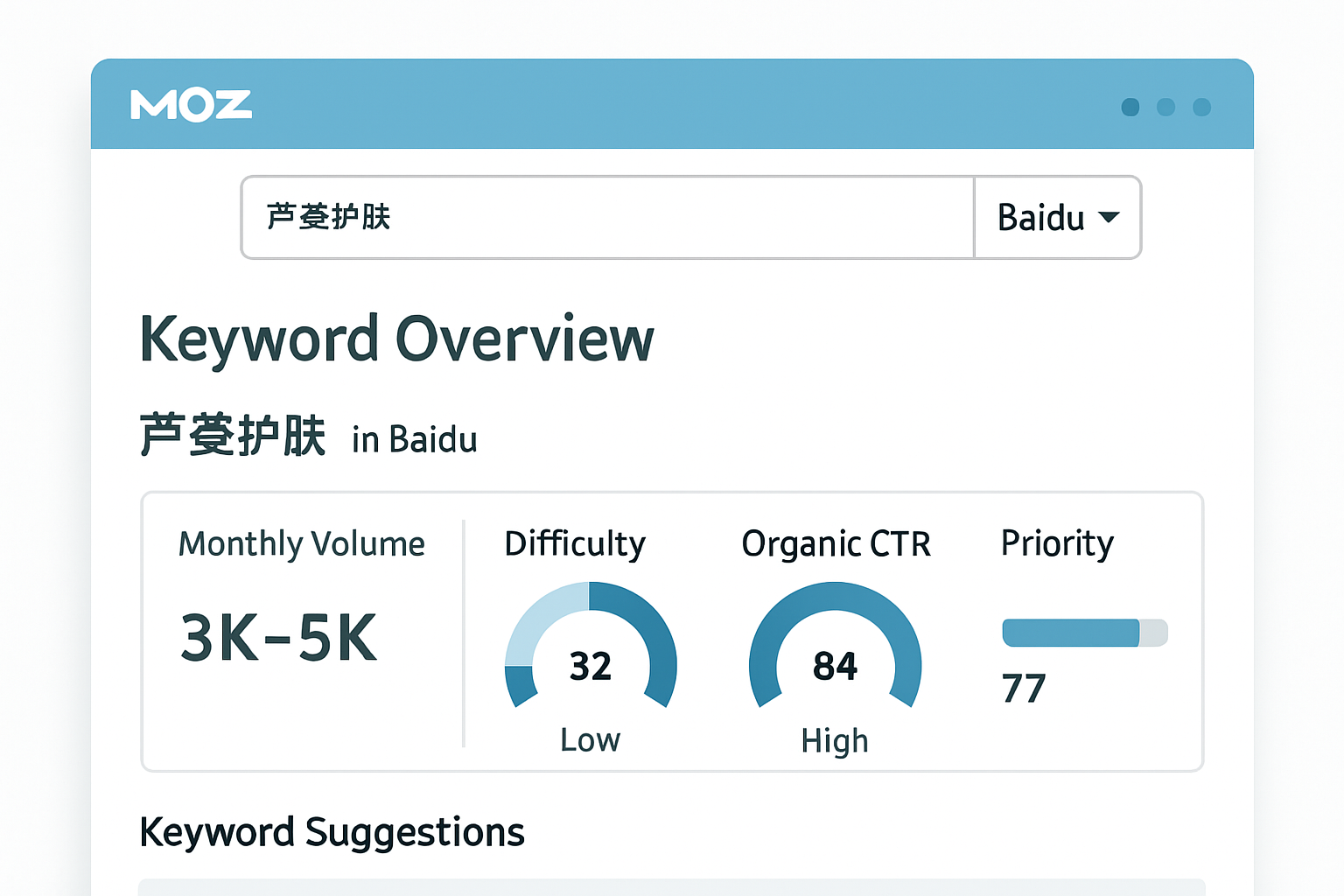
Understanding Soft 404 Errors for Better SEO
Soft 404 errors can mislead search engines and harm your SEO. This guide explains soft 404s in simpl...

Optimizing for the China search engine market, especially Baidu, definitely comes with its own set of challenges due to unique algorithms, language quirks and regulations involved.
Baidu confidently holds the top spot in China’s search engine market but don’t overlook other players like Sogou, Shenma and 360 Search which also carve out respectable slices of the pie. Unlike Google these platforms run on ranking algorithms that follow local regulations and character encoding quirks and need unique optimization tricks.
Grasping Baidu's central role is vital especially considering how it rules the market there. Websites have to jump through a few hoops like getting an ICP license in China and following strict content and technical rules. They also must make sure pages load lightning fast to stand a chance in Baidu’s search rankings.
Moz offers solid keyword research, site audit and on-page optimization tools that can be fine-tuned to fit the unique quirks of Chinese search engines like Baidu.
Powerful keyword analysis tools that help users uncover valuable keywords by digging into search volume, competition, and difficulty measures. It’s like having a trusty compass in the vast SEO wilderness.
Thorough site auditing features that catch technical SEO gremlins like broken links, crawl errors, and gaps in on-page optimization before they can cause trouble.
Tools to keep tabs on backlink profiles, evaluate link quality, and sniff out fresh opportunities for strategic link building.
Offers clear, actionable suggestions for improving on-page SEO elements and content readability so your site shines brighter in search engine results.
A targeted service designed to manage and sync business listings across various online directories, giving your local search visibility a genuine boost.
Delivers instant SEO insights right in your browser, showing on-page metrics, link details, and keyword data as you surf the web.
Comprehensive reporting dashboards that provide deep dives into SEO performance, keyword trends, and overall site health to keep you well-informed.
Moz features an intuitive interface that just clicks with users and plays nicely with other SEO tools, making it a trusty sidekick for marketers aiming to fine-tune their China SEO strategy.
Using Moz Keyword Explorer thoughtfully can uncover high-potential keywords that align with Chinese search habits and user intent. It’s important to pick the right language settings and keep an eye on transliterations while tuning into the search intent.
Set your target region to China and choose simplified Chinese as the main language. This approach helps you connect with what users there really prefer.
Dive into the local search volume and keyword difficulty stats for Baidu and other regional search engines. These insights are invaluable for tailoring your strategy.
Hunt for long-tail keywords in Chinese characters and pinyin to capture how people might be searching. This way, you cover all your bases.
Take a close look at what your competitors are doing with their keywords in the Chinese market. Sometimes the best opportunities are hiding right in front of everyone.
Focus on keywords that balance decent search volume with strong relevance and manageable ranking difficulty. This ensures you are getting the best value for your efforts and making them count.

Moz Keyword Explorer showcasing detailed metrics for Chinese keyword selection targeting Baidu search engine.
Moz’s on-page optimization tools are handy for fine-tuning title tags, meta descriptions, headers and content to hit Baidu’s preferences. They emphasize using localized language and placing keywords front and center while closely following Baidu’s unique ranking signals
Powerful keyword research tools that dig deep to identify top-performing keywords, analyze competitor moves, and uncover fresh SEO opportunities tailored for a variety of search engines—including those unique to China.
Automated website health checks that catch pesky technical SEO glitches, crawlability hiccups, and on-page gaps while delivering prioritized, easy-to-follow fix suggestions.
Tools that let you dive into backlink profiles, sniff out new link opportunities, and track key metrics vital for building domain authority in tough markets.
Keeps a close eye on keyword performance across multiple search engines over time and monitors your competitors’ rankings, supporting smart SEO moves tailored for markets like China.
An all-in-one suite crafted for professional SEO management, blending essential features into an interface that’s as friendly as it is powerful, with an eye on both global reach and local nuances.
Tools that keep your business listings accurate and your local search presence strong—a must-have for capturing foot traffic and interest exactly where it counts.
A clean, straightforward platform design that trims the learning curve for users of all skill levels, while still packing plenty of advanced features under the hood.
Combines data from a wide range of search engines worldwide with tailored insights for emerging markets like China’s distinct search ecosystem, striking a fine balance.
Moz users really need to fine-tune their optimization strategies to fit Baidu’s unique quirks. For instance, they should handle meta keywords with care since Baidu still gives them some attention unlike most search engines these days. Getting canonical tags set up just right is important to dodge any nasty penalties for duplicate content.
Technical SEO compliance really holds the cards when you’re aiming at search engines in China. It means zeroing in on things like server location and snagging an ICP license. You must stick closely to Baidu’s own crawl playbook and make sure your site is easy for crawlers to navigate.
Kick things off by setting up Moz Site Crawl tailored for your China-targeted domain and make it a habit to check in regularly. You don’t want surprises sneaking up on you.
Hunt down and fix any crawl errors or broken links that could cause problems for how Baidu indexes your site. Think of it as tidying up the digital house before guests arrive.
Keep a sharp eye out for duplicate content issues and address them early to avoid penalties in the Chinese market. Trust me, it’s worth the extra effort.
Double-check that your site works well on mobile devices since mobile browsing is dominant in China these days. No one likes a glitchy experience on their phone.
Use Moz’s diagnostics to improve your site speed because from what I’ve seen it directly impacts Baidu rankings.
Taking a peek at Moz’s crawl reports through the China SEO lens really helps marketers zero in on fixes that play nicely with Baidu’s ever-so-specific guidelines. Tackling those pesky issues like resources blocked by robots.txt or sluggish scripts not only boosts crawl efficiency but can also nudge rankings upward in China’s search results
Moz’s SERP analysis and keyword gap tools give you a clear window into how top local competitors tackle Baidu SEO. They uncover handy details like backlink profiles and clever tricks for content localization.
By carefully digging into these competitor insights from Moz, you can fine-tune your SEO strategy in China. It’s all about focusing on the spots they often overlook, beefing up your backlinks, localizing your content with more heart and syncing better with Baidu's ranking signals.
Moz Campaigns can be set up to keep an eye on your rankings not just on Baidu but also on other popular search engines in China. They help you monitor trends in your organic search traffic and offer solid data-driven advice that nudges your SEO performance forward step by step.
Set up location targeting in Moz to focus precisely on the Chinese cities and regions that matter most to your audience. There is no need to cast a wide net when you can fish where the fish actually are.
Choose keyword tracking settings that capture Baidu's most important search queries because if you are not speaking their language you might as well be talking to a wall.
Take a good look at your organic search data like impressions, clicks and click-through rates. These numbers tell a story if you are willing to listen.
Keep an eye on how your page authority shifts over time in the Chinese market. It is a bit like watching a garden grow and patience pays off.
Spot where performance takes a dip and which pages shine. Then use those insights to keep improving your game step by step.
Run regular site audits with Moz to catch technical hiccups or content gaps before they snowball, helping you keep your SEO strategy in sync with China's search engine Baidu and its ever-shifting algorithms and market demands.
When it comes to global SEO, tools like Moz are absolute lifesavers, especially in markets beyond Google’s reach, like China. From what I’ve seen, relying on these tools is pretty much essential for marketers who want to stay sharp and really understand what’s going on with local search behavior—because honestly, flying blind is no fun at all.

Soft 404 errors can mislead search engines and harm your SEO. This guide explains soft 404s in simpl...

Unlock the full potential of your car dealership's online presence with this comprehensive guide to...

Discover why server-side rendering (SSR) is a powerful tool for speeding up web pages, boosting SEO,...

Streamline your SEO workflows with the top project management software reviewed here, designed to he...